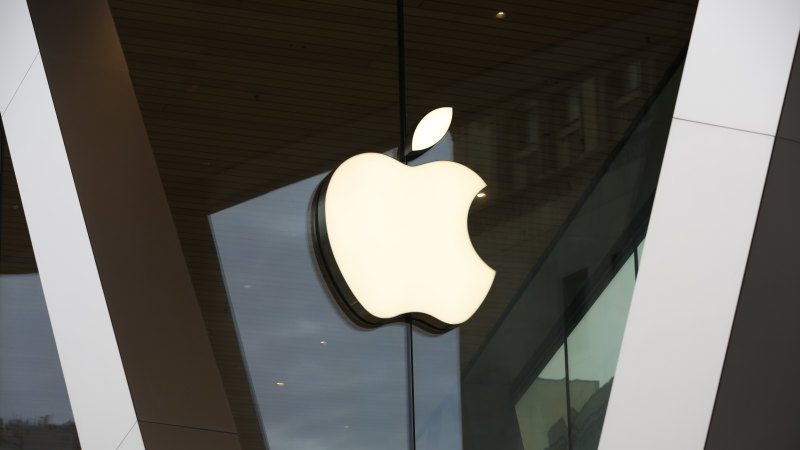Apple allows small businesses to take payments on iPhones, making cash even less relevant
Save articles for later
Add articles to your saved list and come back to them any time.
Apple is expanding its role in the Australian payments sector by allowing businesses to accept tap-and-go credit and debit card payments on iPhones, as banks and fintechs compete for small business customers through their apps.
The technology giant will on Wednesday morning switch on a feature that means iPhones can effectively be turned into merchant payment terminals, with Westpac and fintech Tyro Payments to start offering the service to business clients.
Apple’s change will mean small businesses can accept credit card payments on their iPhone by downloading an app.Credit: AP
The feature – which is already available in the US, and which Google offers here on its Android phones – means businesses can receive contactless payments by downloading a bank or fintech app, without needing a payment terminal or “dongle”.
Banks say this option could appeal to mobile businesses such as tradespeople, micro businesses such as market stalls, or retailers keen to have their staff making sales on the shop floor.
Apple’s vice president of Apple Pay and Apple Wallet, Jennifer Bailey, said in a statement: “The convenience of Tap to Pay on iPhone empowers Australian businesses to offer easy, secure, and private contactless payment experiences to their customers, and help them run and grow their business.”
Chris de Bruin of Westpac says the bank will offer the service to small businesses.Credit: Louie Douvis
Apple will make revenue from charging banks and fintechs that offer the service to merchants, but it has not disclosed the size of its cut.
Westpac’s chief executive of consumer and business banking Chris de Bruin said the bank was mainly focused on offering the feature to smaller businesses such as tradies, delivery drivers, florists or hairdressers.
He said Westpac’s commercial deal with Apple worked “very well” for the bank, which is keen to expand its share in business banking. “What it does for clients is it removes the cost and the hassle of having a large point-of-sale device,” he said.
Tyro chief executive Jon Davey said smartphones would not replace traditional payment terminals, but provide another option that would primarily appeal to small companies and sole traders.
“We think that having these BYO devices is a fantastic and innovative way to be able to provide merchants with choice and allow them to be able to offer services that help them accept payments,” Davey said.
The cost to merchants of accepting payments through an iPhone would be “very similar” to the costs of doing so through a payment terminal, Davey said.
ANZ Bank will also make the service available in coming months through a payment joint venture with French firm Worldline, Apple said, as will fintechs Stripe, Zeller and Till Payments.
Apple also makes revenue from banks through its consumer-facing service Apple Pay, and the tech giant’s growing clout in payments has previously sparked complaints from some banks and calls for regulation.
But de Bruin and Davey said Apple’s latest move did not raise competition concerns for them.
For more than a year, the Australian Competition and Consumer Commission (ACCC) has been considering the competition impacts of Apple’s practice of restricting third-party access to the iPhone hardware that allows payments.
Apple does not process the actual movement of money between accounts, which will occur via existing credit and debit card infrastructure.
In the US, Apple has expanded further into finance by making short-term consumer loans, and last month it teamed up with Goldman Sachs to launch savings accounts. The tech company hasn’t said if it has similar plans for Australia.
As digital payments have taken off and cash usage has plunged, a range of fintechs including Square (part of US fintech Block) have sought to profit from the change in behaviour by offering digital payment services to smaller firms.
Managing director of payments consultancy The Initiatives Group, Lance Blockley, said the trend towards payments being accepted on smartphones was in part a competitive response to the rise of low-cost payment devices such as Square’s dongle, which connects to a phone.
“I don’t think it’s going to displace the point of sale terminal, but it’s another way to accept a digital payment. It’s another nail in the cash coffin,” Blockley said.
The Business Briefing newsletter delivers major stories, exclusive coverage and expert opinion. Sign up to get it every weekday morning.
Most Viewed in Business
From our partners
Source: Read Full Article



